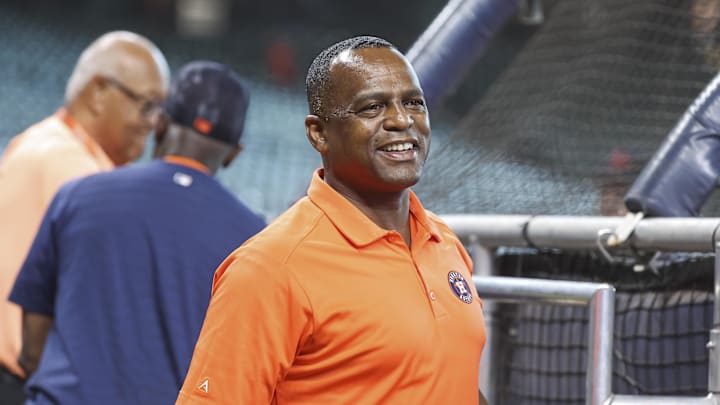Dana Brown front office WAA impact for the Houston Astros: -1.5 games. Rank in MLB: 16. Rank in division: 3.
The defending World Series champs entered 2023 in such great shape that they basically operated their front office on auto-pilot for most of the offseason. They may still repeat.
The fall spat leading to the resignation of World Series winning GM Jim Click bothered club owner Jim Crane so little that he allowed the front office to operate basically by committee well into January (normally a GM’s peak season) before hiring Dana Brown.
It was that committee, not Brown himself, who made the winter’s most consequential decisions. Those included the signing of free agent Jose Abreu and the decisions not to try to retain free agents Justin Verlander, Yuli Gurriel or Will Smith.
The result was one of the sleepier offseasons in the 2023 version of MLB. Since the conclusion of the 2022 postseason, the Astros front office has made only 26 personnel decisions affecting a major league roster. That’s about half a normal level of front office activity.
Eleven of those moves worked out in Houston’s favor against 14 negatives and one neutral, leading to the overall -1.5 impact as measured by the net Wins Above Average of the players involved.
WAA is used in this series of front office evaluations because it is a zero-based version of WAR, therefore enabling valid approximations of impact against wins and losses.
For better or worse, the reality is that the 2023 Astros front office lived off the fat of the land left behind by Click when he exited. When the door closed behind Click, he left 21 players under contract at least through 2023, most of whom constituted the heart and soul of the champs.
That roster of legacies to Brown, with their 2023 WAAs in parenthesis, included a full dozen players who would generate at least a +1.0 WAA in 2023. Just to name a few: Kyle Tucker (+3.2), Yordan Alvarez (+3.0), Alex Bregman (+2.7), Chas McCormick (+2.1), Jeremy Pena (+1.8) and Jose Altuve (+1.6).
Really, how much more was there for Brown to do that wouldn’t involve messing up a good thing?
Here’s the short-term statistical profile on the 2023 performance of Houston’s leadership team. All figures reflect Wins Above Average. Because Brown is a first-year GM, he has no long-term profile.
Acquired by trade, waiver claim or purchase: Since October 2022: 7 players, +1.2 net impact
Signed as a free agent or extended for multiple seasons: Since October 2022: 5 players, -3.7 net impact
System products: Since October 2022: 9 players, -3.8 net impact
Traded away, waived, sold, released or lost to free agency: Since October 2022: 7 players, +4.8 net impact
Although they let Verlander, Gurriel and Smith walk, the Astros did re-sign a pair of 2022 free agent fixtures in pitcher Cristian Javier and outfielder Michael Brantley. Neither made much of an impression in 2023. Javier, coming off a fine 2022 that included two-thirds of a World Series no-hitter against the Philadelphia Phillies in Game 4, got enough run support to run up a 10-5 record despite a 4.56 ERA in 31 starts this year. He, Brantley and Abreu were three main reasons why the overall free agent impact came in at -3.7 WAA.
The Astros rookie class was also, collectively, immemorable. Brown promoted nine system products, only one of whom (pitcher J.P. France, +0.3) produced a net positive impact. The rookie bottom line worked out to -3.8 WAA.
The headline rookie (pitcher Hunter Brown) struggled all season, finally finishing at 11-13, 5.09 in 29 starts, good for -1.3 WAA.
Brown’s biggest contribution came at the trade deadline. Heading the operation of a contending team, he talked the New York Mets out of Verlander for two minor leaguers, and got Kendall Graveman from the Chicago White Sox for a fringe player. Together, Verlander and Graveman were worth exactly +1.1 games to Houston.
This may be an appropriate time to point out that the Astros beat out the Texas Rangers for the AL West division title by the margin of a tiebreaker. So maybe Brown’s contribution was important after all.
